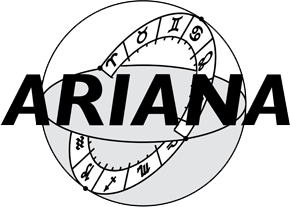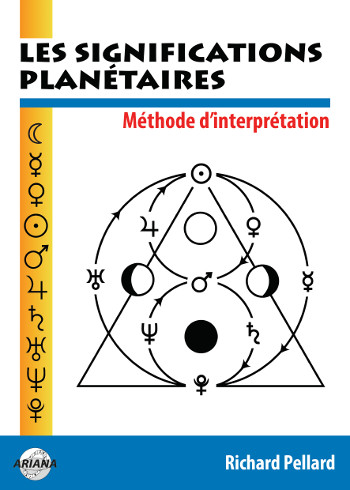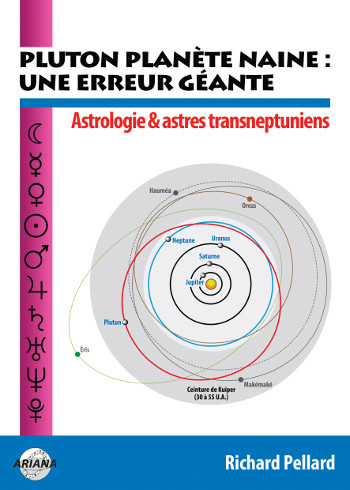Your Planets
Portraits of the Planets
Aspects between Planets
The planetary ages
The planetary families
Planets in Signs
The Planets in comics


The interpretation examples that we are suggesting are very far from being exhaustive: they only show and outline a general frame describing the issues of the planetary function. They should therefore not be taken literally. Each being brings indeed its own responses, more or less original, to the questions raised by a planetary function. There is no magic formula. Through using the R.E.T. and of the Theory of Ages and combining logic, observation and imagination, you will be able to develop a thousand other possible meanings, a thousand other variations on the same theme.
Generally: maintaining the multiple. The unknown or unknowable reality in all its complexity. Absolutely hidden laws. The multiplicity of invisible determinations and conditionings. Total mystery, deep darkness, the secret of the Gods or of Nature. The plurality of interferences and simultaneities between the elements of the “big real” imperceptible. The absolute long term, the impassable distance, the impenetrable density: the unfathomable, the unknowable, the occult, the latent, the virtual or the impossible. Hidden order or complete chaos. The depths of the unconscious. The universal as in itself.
Psychologically: maintain its hidden mysteries, its authenticity of being inexpressible in words and deeds. To be in search of absolute objectivity, of maximum lucidity. Have no illusions and have no a priori nothing or no one. Place yourself outside of any frame of reference: choose your truth, your values, your path according to an instinctive self-knowledge that is impossible to define, justify or share. Being at home and in yourself in the unknown, the shadow, the complex. To be absent from the world, to withdraw into unspeakable and impracticable depths. Being cold, skeptical, marginal, refractory to any regimentation or received idea.
The positive characteristics of the plutonian function are the prospective imagination (trio Extensive Transcendence with Uranus and Neptune), critical mind (trio intensive transcendence with Mercury and Saturn) as well as the Extensive power (associated with Sun and Mars).
The Plutonian is in direct contact with the profound complexity of beings, things and situations. Mysterious and multiple, elusive and enigmatic, ambivalent and unclassifiable, it cultivates its mysteries, its obscure secret gardens, surveys its interior labyrinths, and jealously preserves its inviolable share of shadow. Distant, cold, impenetrable, he strives to keep his mind empty of all certainty, his heart free of all attachment and to have no illusions about anything or anyone. His subtlety is profound, his caustic lucidity, his penetrating intuitions, he is gifted to silently and insidiously influence the course of things, and, devoid of any a priori, he reserves the possibility of imagining all the possible scenarios to walk in life, not out of opportunism, but because he knows that nothing is permanent. Discreetly dominating, fiercely independent, it is not will or desire that drives him but a deaf, dumb and deep internal necessity leading him towards an unknown future.
The Plutonian is a complete skeptic. He doesn’t believe in anything and isn’t even sure he doesn’t believe in anything. Almost nothing finds favor with his inquisitive and suspicious mind, which is always convinced that he must discover the hidden dimension of beings and things, the hidden springs of situations. A ruthless critic, he perceives with acuity where the shoe pinches, where any explanation no longer means anything, he desacralizes, demystifies, brings down the masks and veils that hide the deep reality, indifferent to what such an approach can have unbearable, frightening and worrying for the human mind, eager for certainties and reassuring pretenses, unless it is walled in an unfathomably dense silence to underline the extent to which it adhere to nothing. With infinite patience, he distances himself from everything, puts everything into perspective, plays down everything, his successes as well as his failures: for his conscience focused on the very long term, these are only tribulations on a journey to the distant and unknown outcome.
In negative, the Plutonian is walled in an incommunicability as deep as it is impenetrable. Nothing and no one seduces him, interests him or immediately arouses his spontaneous curiosity. Prisoner of his loneliness, his refractory ego, his silence distilling a heavy unease or his venomous sarcasm, he chills any attempt at a friendly approach, smiling contact, relaxed relationship. Nothing speaks to him, nothing beckons to him, nothing arouses desire in him. The distance that separates him from others is so vast that it is impassable. He has nothing to expect from others, expects nothing from them and has nothing to offer them except his icy and disenchanted skepticism.
In positive, the Plutonian can be perfectly at ease in his deep solitude. It allows him a total authenticity to be beyond all the conventions of relational life, to get in touch without ever getting involved in any way in his encounters. To please or displease, to be considered interesting or not, entertaining or not, is completely unimportant to him. He is content to be what he is.
In negative, the plutonian tends to be absent when it comes to dealing with concrete situations. Facts and the mechanical laws that govern them bore him deeply. He abhors the struggles and confrontations to which existence obliges us: what is the point of fighting when we constantly tell ourselves that nothing is worth anything, that no matter how much we build something tangible, this thing will inevitably be demolished by the passing centuries? Everything passes, everything breaks, everything gets tired, acting only causes a few results that are quickly erased. It is a painful chore for him to have to ensure pragmatically and prosaically his material conditions of existence.
In positive, the plutonian can become a formidable “profiteer” gifted at shielding himself from all material need by exploiting the weaknesses of beings or systems, unless he chooses to lead a dangerous life, in which the proximity of danger and death stimulates a sense of to exist which often fails him.
In negative, the Plutonian, lost in the midst of his multiplicities, his inner labyrinths, crumbled by his own complexity, experiences colossal difficulties in adhering to any ideal or any certainty whatsoever. By dint of believing in nothing, of getting involved in nothing, persuaded that deep down a dark and inescapable fatality decides everything behind the scenes, he ends up saying to himself that any voluntarist choice is illusory and pours into aquoibonism. By dint of not recognizing himself in anything or anyone, he does not even recognize himself in himself and suffers from painful and distressing identity problems. Investing in a project and sticking to it is beyond your strength: it means nothing.
In positive, the Plutonian takes a very long time to decide when he really cannot do otherwise. He then acts very quickly to get rid of this chore. But he largely prefers to let events decide for him, preferring to accompany inevitable changes with lucidity rather than causing them untimely.
In negative, the Plutonian can be terribly cold emotionally, chillingly emotionally insensitive. He has such a distance vis-à-vis his own experience and puts such a great distance between himself and the outside world that nothing seems to be able to reach him in his living flesh, to touch him, to move him. Tender hearts abstain: quivering bodies are for him nothing but meat in motion, compassion only a masquerade to mask each other’s indifference, love only a ridiculous and deceptive attempt to fill the void that forever separates beings. He cannot really invest himself in the immediacy of his feelings, his disembodied spirit despises the testimony of the senses.
In positive, the Plutonian, lucid, cold and calculating, never knows the problems to which those who react too much with their guts and their heart expose themselves. The hindsight with which he apprehends all sensations and feelings makes him very difficult to impression, which can be of great help to the emotional natures around him. FEEDBACK
The inverse function is the solar function
▶ Perspective Subject-Excitability : Maintaining the low energy level.
▶ Perspective Object-Signal : Maintaining the complex.
▶ Perspective Relationship-Communication : Transcendence of Transcendence.
▶ Perspective Integration-Symbol : Maintaining the Multiple.

▶ The Plutonian: Psychological profile
▶ Uranian stage (from 30 to 84 years old): the age of individualization
▶ Plutonian stage (from 164 to 248 years old): the age of disappearance
▶ Uranus-Neptune-Pluto: extensive Transcendence
▶ Mercury-Saturn-Pluto: intensive transcendence
▶ Sun-Mars-Pluto: extensive Power
▶ La dialectique des pouvoirs dans le système R.E.T.

Les significations planétaires
par
620 pages. Illustrations en couleur.
La décision de ne traiter dans ce livre que des significations planétaires ne repose pas sur une sous-estimation du rôle des Signes du zodiaque et des Maisons. Le traditionnel trio Planètes-Zodiaque-Maisons est en effet l’expression d’une structure qui classe ces trois plans selon leur ordre de préséance et dans ce triptyque hiérarchisé, les Planètes occupent le premier rang.
La première partie de ce livre rassemble donc, sous une forme abondamment illustrée de schémas pédagogiques et tableaux explicatifs, une édition originale revue, augmentée et actualisée des textes consacrés aux significations planétaires telles qu’elles ont été définies par l’astrologie conditionaliste et une présentation détaillée des méthodes de hiérarchisation planétaire et d’interprétation accompagnées de nombreux exemples concrets illustrés par des Thèmes de célébrités.
La deuxième partie est consacrée, d’une part à une présentation critique des fondements traditionnels des significations planétaires, d’autre part à une présentation des rapports entre signaux et symboles, astrologie et psychologie. Enfin, la troisième partie présente brièvement les racines astrométriques des significations planétaires… et propose une voie de sortie de l’astrologie pour accéder à une plus vaste dimension noologique et spirituelle qui la prolonge et la contient.
Téléchargez-le dès maintenant dans notre boutique

Pluton planète naine : une erreur géante
par
117 pages. Illustrations en couleur.
Pluton ne fait plus partie des planètes majeures de notre système solaire : telle est la décision prise par une infime minorité d’astronomes lors de l’Assemblée Générale de l’Union Astronomique Internationale qui s’est tenue à Prague en août 2006. Elle est reléguée au rang de “planète naine”, au même titre que les nombreux astres découverts au-delà de son orbite.
Ce livre récapitule et analyse en détail le pourquoi et le comment de cette incroyable et irrationnelle décision contestée par de très nombreux astronomes de premier plan. Quelles sont les effets de cette “nanification” de Pluton sur son statut astrologique ? Faut-il remettre en question son influence et ses significations astro-psychologiques qui semblaient avérées depuis sa découverte en 1930 ? Les “plutoniens” ont-ils cessé d’exister depuis cette décision charlatanesque ? Ce livre pose également le problème des astres transplutoniens nouvellement découverts. Quel statut astrologique et quelles influences et significations précises leur accorder ?
Enfin, cet ouvrage propose une vision unitaire du système solaire qui démontre, chiffes et arguments rationnels à l’appui, que Pluton en est toujours un élément essentiel, ce qui est loin d’être le cas pour les autres astres au-delà de son orbite. Après avoir lu ce livre, vous saurez quoi répondre à ceux qui pensent avoir trouvé, avec l’exclusion de Pluton du cortège planétaire traditionnel, un nouvel argument contre l’astrologie !
Téléchargez-le dès maintenant dans notre boutique